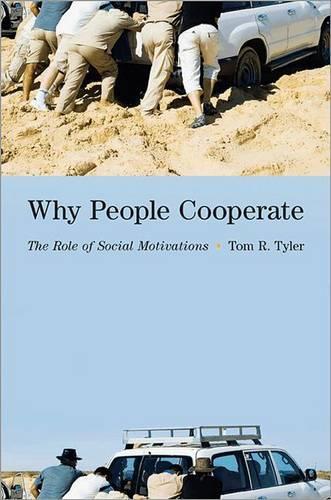
Why People Cooperate: The Role of Social Motivations
(Paperback)
Publishing Details
Why People Cooperate: The Role of Social Motivations
By (Author) Tom R. Tyler
Princeton University Press
Princeton University Press
7th May 2013
United States
Classifications
Tertiary Education
Non Fiction
Social and ethical issues
Occupational and industrial psychology
302.14
Short-listed for Choice Magazine Outstanding Reference/Academic Book Award 2011
Physical Properties
Paperback
232
Width 152mm, Height 235mm
340g
Description
Any organization's success depends upon the voluntary cooperation of its members. But what motivates people to cooperate In Why People Cooperate, Tom Tyler challenges the decades-old notion that individuals within groups are primarily motivated by their self-interest. Instead, he demonstrates that human behaviors are influenced by shared attitudes
Reviews
One of Choice's Outstanding Academic Titles for 2011: Top 25 Books "I am a fan of Tyler's approach... [H]e supports his theoretical approach by clear and rigorous research rather than the polemic that all too often substitutes for thought in criminology... [H]e demonstrates the paucity of the view that human action is pushed and pulled by the lures of rewards and threats of penalties... [H]e focuses not on the supposed outcomes of policing (such as crime rates), but upon how policing is conducted."--P.A.J. Waddington, Policing "One of the clear strengths of Why People Cooperate is its applicability to a variety of disciplines. Certainly, social psychologists and some political scientists with an empirical bent will want to read this book because it offers new ways to explore interactions and exchanges within groups. Industrial/organizational psychologists and researchers in management science, too, will readily see the applicability of Tyler's persuasive evidence... Researchers interested in social policies... are also likely to find grist for their respective mills in this brief but rich book."--Dana S. Dunn, PsycCRITIQUES: Contemporary Psychology: APA Review Of Books "[T]he book is well written, the ideas are presented clearly and the arguments are empirically grounded. Professor Tyler not only captures the reader's attention, but also manages to change his/her mind about the topic. The book is highly recommended to researchers, academics, professionals and even laypeople interested in the topic."--Francesc S. Beltran, Journal of Artificial Societies Social Simulation "With innovative analyses throughout Why People Cooperate: The Role of Social Motivations, Tom Tyler offers the foundation for participation based in social relationships. Numerous recent studies are cited that build his assertions and provide documented results for motivating cooperation within a variety of group settings."--Paula Tripp, Journal of Family and Consumer Sciences "Summing up, Tom Tyler's book provides a very useful framework for defining and describing various types of cooperation, provides a compelling empirical analysis of instrumental and social motivations that underlie cooperative behavior, and draws out the implications of these findings for organizational design."--Timothy R. Wojan, Journal of Regional Science
Author Bio
Tom R. Tyler is the Macklin Fleming Professor of Law and Professor of Psychology at Yale Law School.
